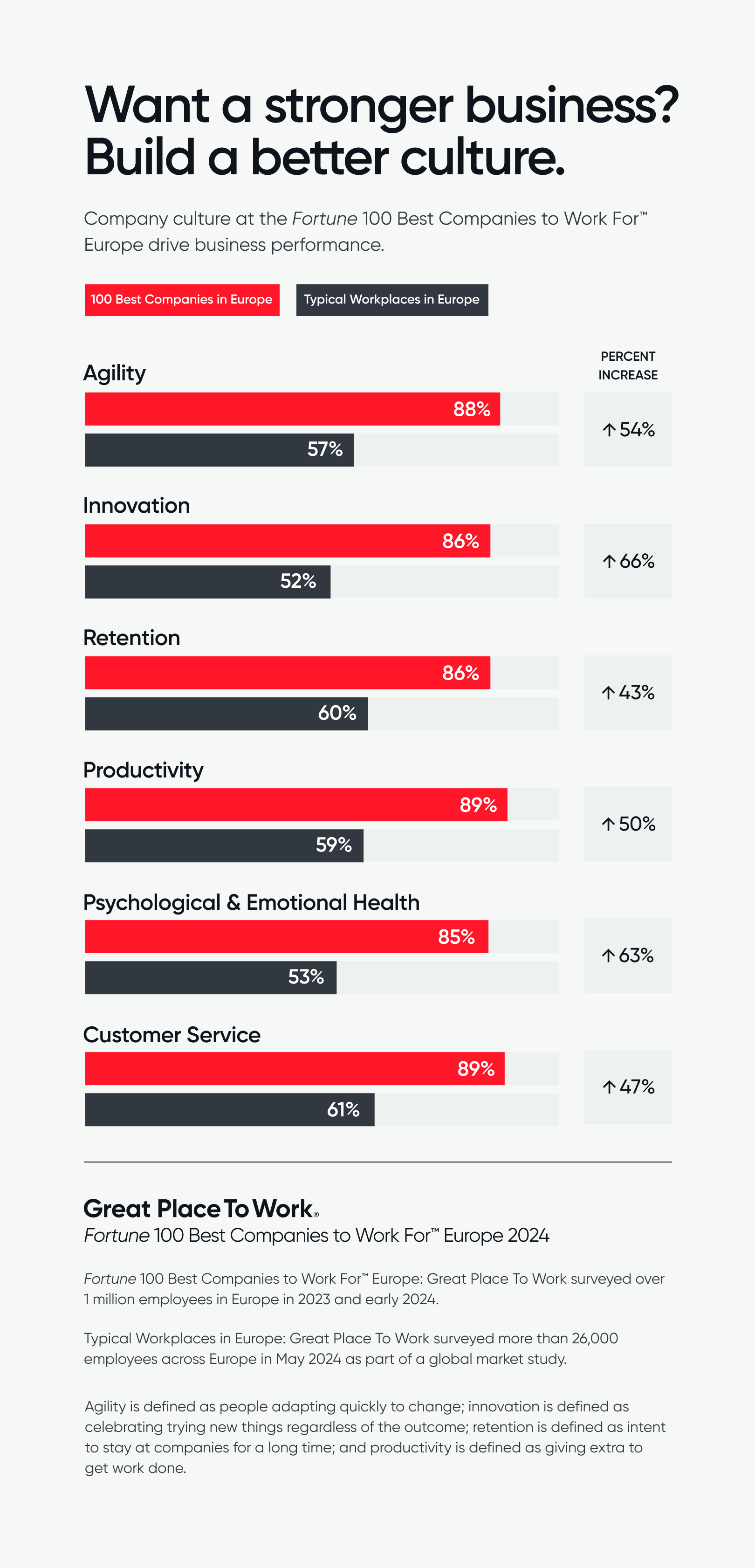Great Place To Work research highlights the undeniable connection between positive workplace culture and improved productivity, retention, innovation, agility, well-being, and customer service.
You might intuitively know that company culture affects business results — for better or worse — but knowing isn’t enough.
What will get executives to pay attention, lean in, and act? Data. Give them proof that culture change impacts the bottom line.
Amid labor shortages, economic uncertainty, climate change, and geopolitical tensions, European business leaders must create cultures that are resilient and forward-thinking to remain competitive.
The Fortune 100 Best Companies to Work For™ Europe provide a roadmap for others to follow. When we look at their experience compared to typical European workplaces, we see the impact company culture has on business performance.
These organizations have built strong connections with employees that lead to high levels of agility, retention, referrals, productivity, and well-being.
Here’s a closer look:
1. Great workplaces are more productive
The gap between U.S. and European productivity continues to widen. U.S. productivity outpaces that of Europe, where it has flat-lined and even fallen slightly since the outbreak of the COVID-19 pandemic. Headlines of a competitiveness crisis and calls for Europe to get more productive are widespread.
That is not the experience at the 100 Best in Europe, where nearly 90% of workers say people give extra to get the job done, compared with 59% at a typical workplace in Europe – a 50% increase.
Giving extra to get the job done is something every leader wants and needs, but that can’t happen unless you’ve created a culture of cooperation.
What drives productivity? Camaraderie. Great Place To Work® research shows the No. 1 driver of giving extra among these companies is camaraderie. Employees are 108% more likely to give extra at work if they feel they can count on people to cooperate.
Want them to work harder? Build a culture where people feel they can count on each other.
2. Retention levels and company referrals are higher at great workplaces
Europe’s tough labor market increases the urgency for leaders to improve their culture to keep top talent.
At the 100 Best in Europe, 86% of employees plan to work for their employer for a long time, compared with 60% of employees at the average European employer.
High workplace turnover can be costly in revenue, morale, and productivity, and with rising labor and skills shortages, recommendations and referrals can make all the difference.
Nearly 90% of workers at great workplaces would recommend their company to family and friends as a great workplace compared to 55% at an average workplace — 62% higher.
What drives retention? Purpose. Feeling like your work has meaning makes employees 67% more likely to want to work for your company for a long time.
Want to improve your retention levels? Make sure employees feel their work matters.
3. Great workplaces have higher innovation and agility levels
To remain competitive, leaders need their workforce to be innovative and adaptable. Lack of agility will lessen your ability to adapt to AI and meet your environmental, social, and governance (ESG) goals, to name a few workplace challenges.
Nearly 90% of employees at the 100 Best in Europe describe their workforce as being able to adapt to changes needed for success — a 54% increase over the typical European workplace.
Not surprisingly, innovation rates are also higher — 66% higher.
What drives agility? Celebrating trying new things. Cultures that celebrate people for trying things, no matter the result, are 66% more likely to describe their culture as agile, and 36% more likely to describe their culture as innovative.
What drives innovation? Training and development opportunities. When employees are given these opportunities, they are 69% more likely to report having meaningful innovation opportunities.

4. Great workplaces are more psychologically and emotionally healthier with higher levels of work-life balance
Although Europe has championed and adopted the four-day work week, that alone doesn’t mean that workers have a better work-life balance or a healthier culture.
Only 53% of workers at typical European workplaces describe their culture as psychologically and emotionally healthy, compared to 85% at the 100 Best in Europe — an impressive 63% higher.
Also, 85% of workers at the 100 Best in Europe say they’re encouraged to balance their work and personal life, and 92% say they can take time off when necessary, compared with 53% and 63%, respectively, at average European workplaces.
Burnout and workplace stress is estimated to cost European businesses around 3.2 billion Euro annually.
What drives workplace mental health? Inclusion and belonging. Employees who feel like they can be themselves at work are 45% more likely to report having a psychologically and emotionally healthy workplace.
5. Customer service is better.
Great workplaces with high-trust cultures create a virtuous cycle of care. When leaders care about their people, their people work hard and care about their employer, all of which has a positive experience on customers.
At winning workplaces, 91% of people say their company is a great place to work, compared with 59% at an average employer. And 89% of people at winning companies say their customers would say their service is excellent, compared with 61% at typical employers.
What drives customer success? Adaptability and pride. Employees are 57% more likely to say their service is excellent if they feel their workplace is agile, and 50% more likely if they feel their work makes a difference.
The evidence is clear: a positive workplace culture is essential for business success.
European business leaders must evaluate their workplace culture, identify areas for improvement, and commit to meaningful changes. The future of your business depends on it.








